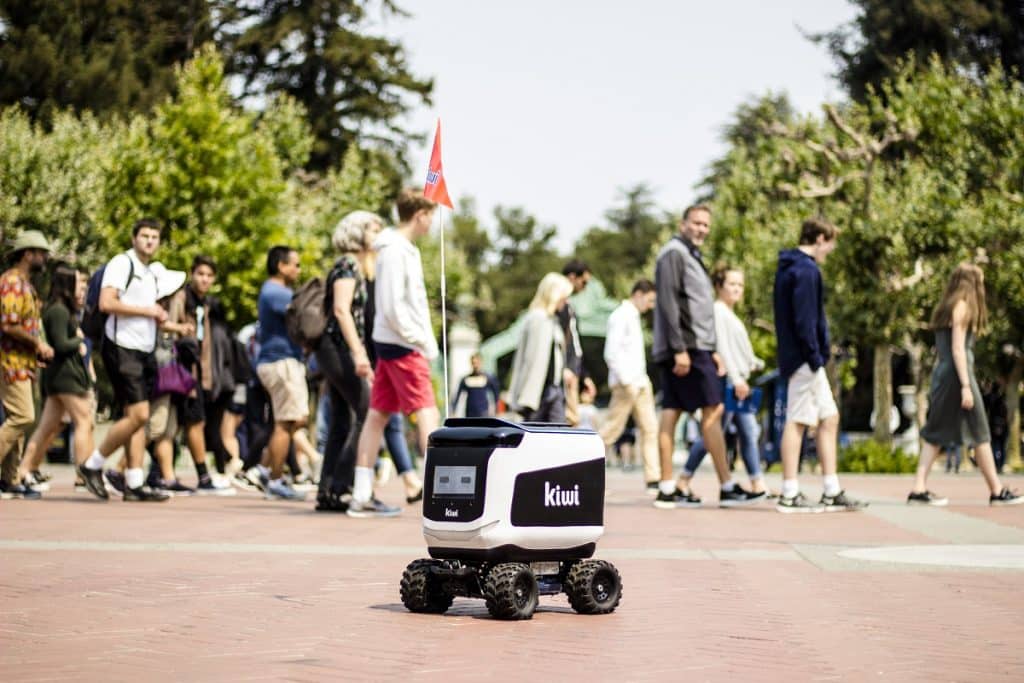Kiwibots help University of Denver students learn how to build successful business
March 10, 2020 | AUVSI News

Delivery robots are popping up on college campuses across the United States, but the journey behind the Kiwibots currently operating on the campus of the University of Denver (DU) ironically enough did not begin on U.S. pavement.
Initially launched as a human-based food delivery company in Bogotá, Colombia, the first iteration of Kiwibot as a company was sold, which led to the team behind Kiwibot wanting to replicate its model where students could conduct deliveries for other students in the United States. The team found out, however, that the cost structure was not replicable from Latin America to the U.S., according to David Rodríguez, Kiwibot’s head of business.
“This was the point we decided we needed to start building robots,” Rodríguez tells AUVSI.
Kiwibot’s latest inception was at the University of California, Berkeley’s Skydeck Acceleration Program. It was here that the Kiwibot team crafted its robot and full-stack technology, developing every application and platform that the robot runs on. After 85,000 orders at UC Berkeley, Kiwibot landed at DU after Rodríguez and DU Adjunct professor Jim Ducay met last summer.
According to Rodríguez, Denver was an ideal place for Kiwibot to operate because of the city’s welcoming nature to technology, sunny conditions — although the city also offers Kiwibot the opportunity to develop snow capabilities — and friendly regulators.
Real business, real impact
The project behind the Kiwibot service operating at DU is led by students. The project is a result of DU’s Project X-ITE, which is a cross-disciplinary initiative where innovation, technology and entrepreneurship intersect.
According to Ducay, who supervises the students on the project, everything about the student-run business has been built from the ground up. The relationship between Kiwibot and DU is very much a partnership, as opposed to a company coming in and dictating the details of the operations.
From the beginning, the goal of the Kiwibot/DU partnership has been to build a business that leverages the strengths of students from across the campus to run a successful service and create a lasting business model.
“The students are learning experientially,” Ducay tells AUVSI. “They’re going out and bringing in students from across the campus. That’s how real businesses work. They’re working on a real business with real impact on campus.
“We’re building a student team no differently than you’d build a regular company,” Ducay adds.
Since beginning operations on the DU campus in Sept. 2019, Kiwibots have been delivering food items from a variety of eateries including Chipotle, Fat Shack and Birdcall, a quick-service restaurant tech concept based in Denver.
Thus far, the project has been extremely beneficial for the businesses in the Kiwibot delivery pool.
“We’re giving eateries a delivery option that they don’t currently have. They have people driven delivery options, but this is one that is customizable for them,” Ducay says.
The service has also proven beneficial for students and faculty, as they can simply go on the Kiwibot app and place an order to be delivered to them as opposed to having to go out.
The service is still in the trial phase, but Ducay is quick to point out that people shouldn’t get caught up on the word “commercial.”
“We’re building a business, addressing the technology, operations and marketing. We’re covering all of those business operations as we build this,” Ducay explains.
“The word commercial can mean a lot of things. I’d define commercial as we have a rock solid business, delivering food and generating revenue. I couldn’t ask to be in better position than where we are right now.”
Part of the campus
To be accepted by the public, new and innovative technology of course has to be functional, but ideally, it would also be presented in a way that is appealing to the masses. Kiwibot checks both of those boxes. Ducay describes the robots as “personable,” from their size to the way they interact with people. The robot’s front display even winks at you, which helps create healthy relationships and makes the technology non-threatening.
Traveling at just two miles per hour, the robots actually have the chance to be a part of the campus experience so students and faculty can experience them firsthand.
“The robots have been accepted as part of the flow of the people,” Ducay says.
Since the robots began operating on campus, the reaction to them has been nothing but positive, Ducay says. On the campus of DU and beyond, the robots “are loved by everyone,” according to Rodríguez.
“A cute robot could outperform a very technologic and expensive one in terms of human acceptance,” Rodríguez says.
If that statement proves true, that cuteness — and functionality — could propel Kiwibot to the heights that Rodríguez believes they will one day achieve.
“Kiwibot will be in every major city and campus in the U.S. Watch out!” he says.
Besides UC Berkeley and DU, Kiwibots also currently operate in Medellín, Colombia (staging campus) and at Shih Hsin University in Taiwan, as part of an early rollout.
The video below shows how the Kiwibot service works:
- Industry News


